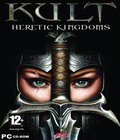Genre: Role-Playing
Publisher: Project Three
Developer: 3D People
Release Date: October 1, 2004
There's this problem with a lot of RPGs that offer detailed morality systems. It's never a major problem, but over time, it can get to be a very noticeable one, more so because it's a thread that runs from game to game with surprising regularity. The problem is this: a good number of game writers have no idea how to present a realistic-sounding set of choices in PC/NPC dialogue.
This is relevant, I swear. Bear with me.
Almost invariably, your character will be approached by someone who wants you to do something for them. "Oh, help me brave adventure person! My wife and children have been kidnapped! I am distraught! Save them!" Also almost invariably, your options for a reply look something like this:
- "Of course I will save them! I am brave and stalwart and a good person with a big sword!"
- "I'm too neutral to get involved in this situation. Goodbye."
- "I enjoy eating babies. Give me all your money so I can fund a trip to find and devour yours."
Anyway, Kult: Heretic Kingdoms doesn't do this. That was the big point of this little story.
What Kult does do is be an action-RPG that failed to remind me of Diablo 2 even a little bit, much to my surprise. It did, however, make me have a good time. I give it a lot of respect for that.
Kult takes place in a fantasy world, but this isn't the bright and cheerful fantasy world in which a lot of games take place. The land is just coming out of the control of the Theocrat, a leader who took up the legendary Godslayer sword (which did indeed slay God, and thus is a powerful artifact of belief) and proclaimed himself the true leader of the land by blood and divine right. His reign was violent and corrupt, and over time, it seemed as if his personal religion was in conflict with the doctrine of the Temple, which claimed that God would rise again.
This became a point of no significance when the Inquisition showed up. After the overthrow of the Theocrat, the Inquisition took it upon itself to make sure that no man could use religious beliefs as a foothold to gain control over the people again, via the rather direct method of stamping out all worship and religion in the land. That's where you come in, as a woman named Alita. She shares the same blood as the Theocrat did, being a descendant of the ancient family who once held the Godslayer sword, and so her blood right is to protect that sword with her life. She's also a member of the Inquisition, trained using their magic and their skills to destroy any particle of religious belief lingering in this damaged but healing world.
One may begin to see some personal conflict coming out of this.
One doesn't have to, however. One of the interesting things about Kult is how much wriggle room it gives you to be either a servant of the Inquisition, a protector of religious freedoms, or just a girl trying to keep her head down and get her job done without pissing off too many people. There are, I'm told, six endings to the game and a number of plot forks, and I can see that easily, based on the level I've reached.
Dialogue is also written extremely well. Alita comes off as a sarcastic, tired career worker, to the extent that one shopkeeper remarks "Lady, I sure hope you're a good customer, 'cause you're sure as hell no fun to talk to." Yet her softer side shows while she's dealing with children or the injured, she shows hints of interests outside her line of work, and some of her lines reflected my thoughts on the choices I was making rather nicely. Other characters are pretty up and down, quality-wise, but on a whole, you wouldn't be able to tell this game was originally in German (if I hadn't just told you). Additionally, there's a good bit of voice acting in here. The obvious person to point out is Tom Baker, who does all the narration and whose voice, as always, rings true and clear with quiet competence. The other voice actors... well, I don't remember wanting to tear my ears off at any point.
Kult also looks great, while we're dwelling on presentation. I'm not sure if the backgrounds are hand-painted, but I'm reasonably certain that the cut scenes are. Spell effects are glowy and beautiful, and/or harsh and deadly as appropriate, with lots of real-time lighting effects being bandied about. Alita's character icon changes as her armor and weapons change, so she's never holding a sword onscreen when you've equipped a polearm. This system does suffer a little from the same kind of weirdness we saw in Bioware's games: pathfinding – or "getting your character to walk where you bloody well clicked " – can be a little picky. Kult's backgrounds are occasionally difficult to move around in because areas where you can't walk are not always clearly marked.
Right. So that's the presentation. It's pretty, sounds good, looks better, the writing is top form. Time to talk about how it plays.
At its core, Kult's battle system is fairly pedestrian. Left-click moves Alita, while right-clicking starts her in hacking away with her weapon or firing from range. Long-range attacking is streamlined; you don't have to worry about running out of arrows, and spells are cast in the same fashion: Equip your wand, select a spell, right-click to cast. Wait for it to recharge, cast again.
Just don't wait while standing still. Indeed, playing this game can be kind of a pain at times, until you learn that the best strategy isn't to treat it... well, like Diablo 2, that mainstay of comparison for all action RPG games. (I think I have to fulfill a quota of references to that game in order to be taken seriously as a game reviewer.) Anyway, the best way to fight in this game is hit and run, or better yet, ranged attacks and run. Magic and arrows are your best friends. To put it bluntly, if you stand still, you are going to get creamed, at least in the first part of the game, until you've built up a number of useful attunements.
Attunements? Right. Those are cool. Almost every piece of equipment you'll find has an attunement attached to it. Some of these attunements are neutral, and some are tied to the four elements. During the limited character creation process, you'll choose a couple of natural attunements to start with, from those that give more frequent critical hits, to ones that improve your missile weapon aim, to others that just plain make you luckier. As you travel, you naturally collect more items, which have secret attunements locked away in them. Using that item and building its power unlocks the attunement, which can be added to your stockpile.
Attunements are the real meat of the game, customization-wise. Magic spells are attunements, as are special abilities. Each one needs to be unlocked before use, raising a couple of strategic questions: What does that new shield have on it that I don't already have? It's weaker than the one I just found, should I stick with what I've got or try for a new attunement that stands a chance of being tactically superior? Add that to the fact that attunements have prerequisites, requiring that your character be magically aligned with a certain element (your magical alignment can be changed anytime by certain NPCs) or be using a certain type of equipment to activate. You can't use a bonus to aiming your arrows if you're hitting people with a halberd. Getting past some seemingly impossible situations in the game might just require you to back off and fiddle with your attunement configuration.
There are a couple of other facets of gameplay that I should mention. One is your character's ability to pass into the "Dreamworld," a sort of misty mystic plane. This has its place in puzzles (Is there a big gaping hole in the ground? Maybe it's not there in the Dreamworld!), in combat (Taking a couple swipes at someone, phasing into an alternate plane of reality, ducking around behind him, and cracking him across the back of the head is a great tactical option), and in quests, where you'll occasionally have to make repairs to the Dreamworld or drive off a threat to someone's psyche to affect the "real" world. It's a nice layer, faintly reminiscent of Legacy of Kain, and it doesn't feel tacked on.
The other gameplay detail that strikes me as important is the Blood Points system. Alita starts the game holding a medicinal sack of herbs, and that takes the place of healing potions. As she takes damage, her health drops. You can use those herbs to heal yourself, but each time you do, the amount of maximum possible health also drops. You can constantly heal yourself up to "full," but "full" gets to be a little less every time you do it, until you finally have to cut and run to a campfire or inn where you can drop into a healing overnight meditation.
That whole "How does this play" section came out drier than I anticipated, so I'm going to give a condensed version: it's your basic hack-and-slash action RPG battle system with a number of interesting and fairly unique twists.
This is a good way to sum up the entire game, actually. It's a solid experience with a somewhat steep learning curve (the manual tries, it really does, but I felt like I needed to write those above paragraphs just to get it straight in my mind) and a surprisingly deep skill system. The writing is all pretty good, if a little overly sarcastic at times, and the quests and plot forks you'll take on aren't just filler. They've been tied into the storyline very well indeed.
 As for downsides? Well, it is astoundingly hard to get started in this game. I was really close to just giving up entirely. Once you hammer through most of the game, you'll have attunements that are alarmingly powerful and can make the game a little too easy, ironically. (My favorite is one that reflects damage back onto the enemies you fight. You can heal and beef up your defense. They can't.) It feels too short, although there's a good bit of replay value. Also, this might just not be your kind of game.
As for downsides? Well, it is astoundingly hard to get started in this game. I was really close to just giving up entirely. Once you hammer through most of the game, you'll have attunements that are alarmingly powerful and can make the game a little too easy, ironically. (My favorite is one that reflects damage back onto the enemies you fight. You can heal and beef up your defense. They can't.) It feels too short, although there's a good bit of replay value. Also, this might just not be your kind of game.
Kult just feels like a quality act. I'm not saying it's the best action RPG you'll ever load onto your PC's hard drive. I'm just saying it's probably the best one that's going to hit the shelves this year.
Score: 9.0/10
More articles about Kult: Heretic Kingdoms
































































